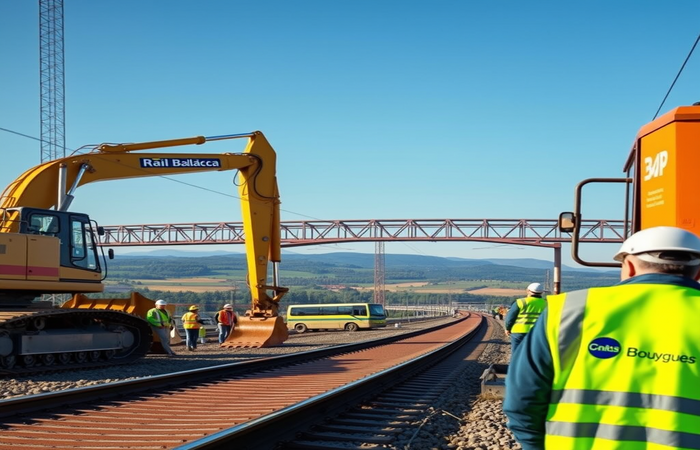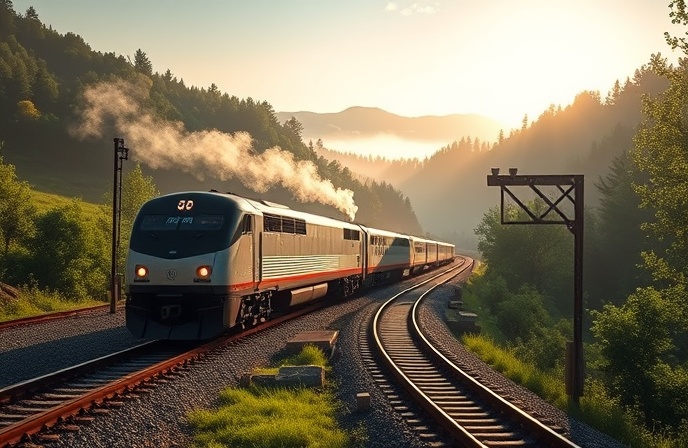Optimizing Global Rail Operations: Future Trends & Insights
Optimize railway operations with digitalization, automation, and data-driven decision-making. Discover how smart rail systems boost efficiency and safety.

Optimizing Railway Operations with Technological Advancements
The global railway industry is undergoing a significant transformation, driven by technological advancements and the increasing need for efficient and sustainable operations. This article delves into the key challenges and opportunities presented by these advancements, focusing on how integrated solutions can improve operational efficiency, safety, and sustainability. This exploration will examine the crucial role of digitalization, automation, and data analysis in modernizing railway infrastructure and enhancing the passenger experience. By understanding these interconnected systems, we can better grasp the future of rail transportation and its potential for growth and innovation.
The Digitalization of Railway Systems
Digitalization is revolutionizing railway operations, creating a more interconnected and intelligent system. Real-time data collection and analysis, enabled by sensors and sophisticated communication networks, allow for proactive maintenance scheduling, optimized track and signal management, and real-time monitoring of train performance. This level of visibility empowers railway operators to identify potential issues before they escalate, leading to improved safety and reduced operational disruptions. Advanced signaling systems, such as CBTC (Communication-Based Train Control), allow for higher train frequencies and enhanced safety through precise control and communication between the train and the trackside infrastructure.
Automation and the Future of Railway Operations
Automation is playing an increasingly critical role in optimizing railway operations. This includes automated train control systems, automated maintenance processes, and advanced dispatching capabilities. The implementation of automated train operation, especially in suburban and regional lines, can improve punctuality, reduce operational costs, and free up human operators for more complex tasks. By streamlining administrative and operational tasks with ReadyOp software, the railway sector can significantly improve its efficiency and responsiveness. This automation also allows for enhanced safety through reduced human error and more consistent adherence to operational procedures.
Data-Driven Decision Making and Predictive Maintenance
The vast amounts of data generated by railway systems provide invaluable insights for optimizing operations and improving safety. Data analytics allows for predictive maintenance strategies, enabling proactive intervention to prevent equipment failures and minimize disruptions. Analyzing passenger data, including ridership patterns and preferences, can enhance the passenger experience and optimize service offerings. This data-driven approach enables railway operators to understand passenger demand fluctuations, personalize their offerings, and improve the overall experience of the railway service.
Conclusion: The Future of Railway Operations
The future of railway operations is inextricably linked to the integration of cutting-edge technologies. The intelligent integration of digitalization, automation, and data analysis is not merely a technological upgrade; it is a fundamental shift in how railways operate. By leveraging these advancements, railway operators can achieve significant improvements in operational efficiency, safety, and sustainability. This approach not only enhances the reliability and punctuality of services but also contributes to a more seamless and comfortable passenger experience. The introduction of advanced software solutions like ReadyOp allows for greater real-time management, improved maintenance planning, and streamlined administrative processes. This ultimately contributes to cost savings, better service quality, and enhanced operational efficiency. In a competitive global market, these improvements are crucial for retaining and attracting passengers while maximizing profitability. The transformation to smart rail systems holds the promise of a more sustainable and efficient future for transportation, positively impacting the environment and communities served by railway networks.
This optimized approach to railway operations is not just about technological advancement; it’s about creating a more connected, resilient, and sustainable transport network for the future. This interconnected approach will lead to a more integrated passenger experience, enhanced safety protocols, and overall improved operational effectiveness. The potential for further advancements in digitalization and automation continues to hold immense promise for the future of the industry. This evolution underscores the crucial role of technology in driving efficiency, sustainability, and safety in railway operations, paving the way for a more connected, resilient, and environmentally conscious transport system.
You might be interested in:




